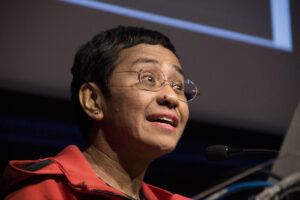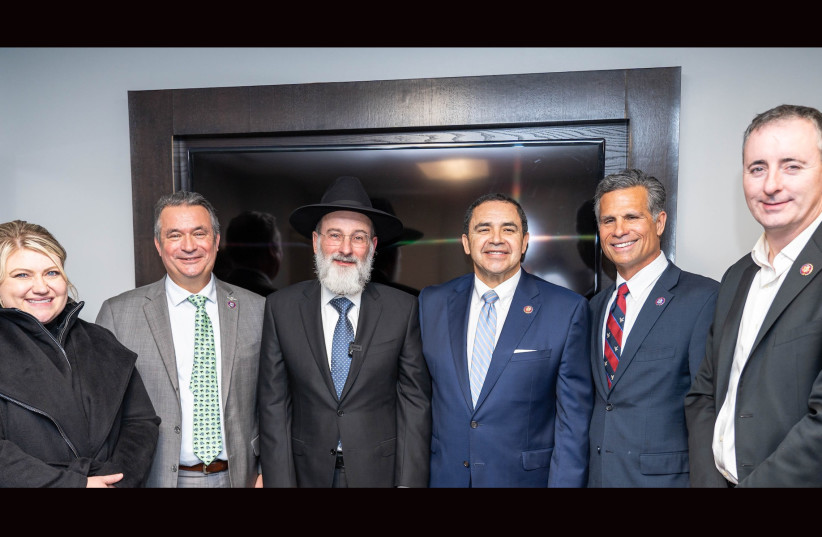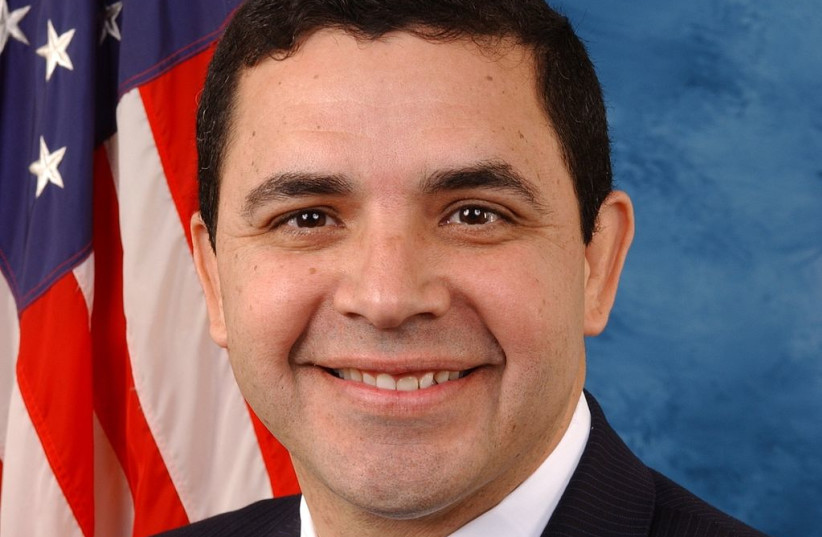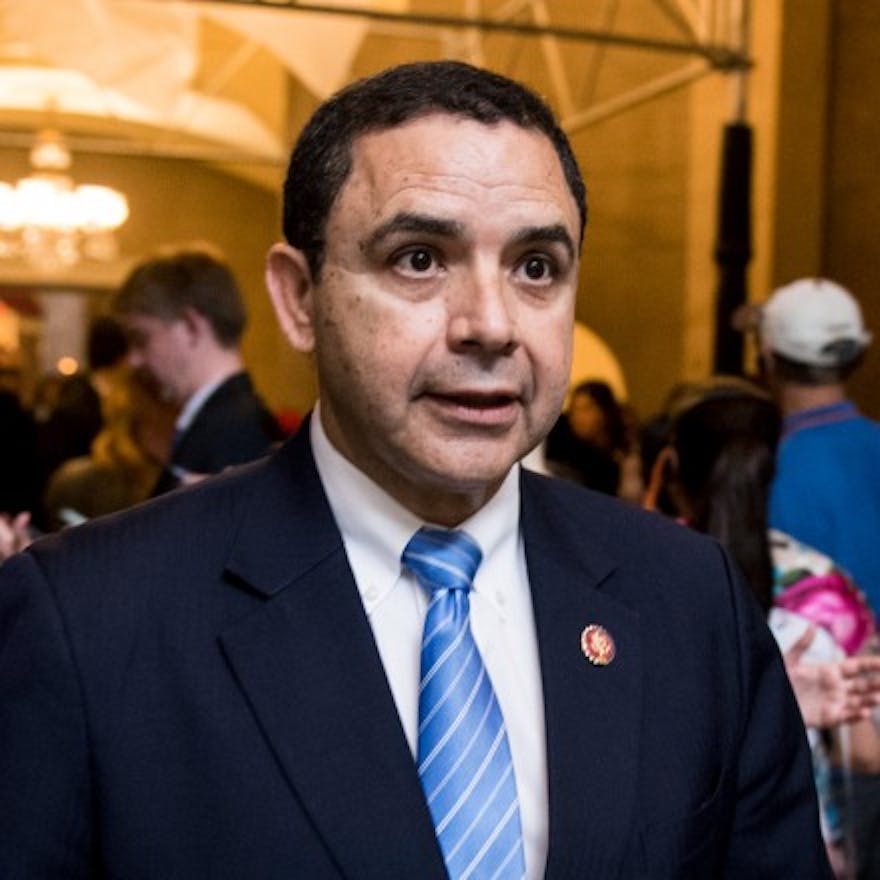It’s possible that I shall make an ass of myself. But in that case one can always get out of it with a little dialectic. I have, of course, so worded my proposition as to be right either way (K.Marx, Letter to F.Engels on the Indian Mutiny)
Friday, January 21, 2022
By AFP
Published January 19, 2022
After Microsoft announced it would spend tens of billions of dollars to buy a video game company, World Bank President David Malpass on Wednesday drew a contrast between the deal and the amount of money rich nations have pledged to help poor countries facing higher debt loads.
“I was struck this morning by the Microsoft investment — $75 billion in a video gaming company” compared to just $24 billion over three years in aid for the poorest countries, Malpass said, referring to donations allocated in December by 48 high- and middle-income governments.
“You have to wonder, is this the best allocation of capital?” he said of the Microsoft deal in a discussion at the Peterson Institute for International Economics.
“There has to be more money and growth flowing into the developing countries.”
Microsoft on Tuesday announced the purchase of US gaming giant Activision Blizzard, the firm behind hits like “Call of Duty.”
Malpass has called on the richest nations in the Group of 20 to provide more debt relief to the world’s least-developed countries that qualify for interest-free loans.
A G20 debt service suspension initiative expired at the end of 2021, and this year alone, those countries must pay $35 billion in debt service.
“The debt payments are staggering,” and it has become a “compounding” problem, Malpass said
By AFP
Published January 19, 2022
The decline of women in the workforce is a problem specific to the United States, the International Monetary Fund (IMF) found -
An exodus of older workers is the “common thread” behind the baffling labor shortages faced by companies in the United States and Britain, the IMF concluded in a report released Wednesday.
The “mismatch” between job openings and workers’ willingness to do those jobs, especially low-paying positions, also plays a role, but pandemic aid payments were not a big factor keeping workers away, the International Monetary Fund found in its research.
However its report said the issue of women sitting on the sidelines due to difficulties with childcare and schooling amid the Covid-19 pandemic was a problem specific to the United States alone.
“We found that lower participation among older workers not returning to work is the common thread, and matters most. Mismatch plays a secondary role,” authors Carlo Pizzinelli and Ippei Shibata said in a blog post about the findings.
“The fall in female participation is unique to the US, but quantitatively important,” they said, noting that as of October 2021, the absence of mothers of children under five years old “accounted for around 16 percent of the total US employment gap with respect to pre-Covid levels.”
Contrary to the narrative often promoted in the United States, the researchers found “only a modest and temporary effect” from expanded unemployment aid.
The more important issue in both countries was that “the share of older workers not in the labor force rose markedly.”
In the United States, the exodus and early retirements of workers 55 and older combined with the “she-cession” of female workers, “may account for roughly 70 percent of the US employment gap compared with pre-Covid levels,” the authors said.
In the UK, the absence of older workers accounts for 35 percent of the shortage.
Both countries have been hit by a surge in employees leaving their jobs known as the “great resignation,” but the majority of unfilled openings are concentrated in low-wage jobs, the report found.
“Workers may have become more reluctant to take up jobs in low-skill occupations, which are traditionally associated with lower wages and poorer working conditions,” the report said, although that explains only a small fraction of the employment gap.
Resolving the labor shortage and preventing persistent scars on both economies requires addressing the pandemic so workers can return to their jobs, the authors said.
They also recommend “well-designed training programs to reduce risks of mismatch.”
In the United States, they called for “expanded childcare and preschool opportunities,” measures US President Joe Biden has pushed for in legislation that is stalled in Congress.

A new report by non-partisan group Environment America finds American big box stores have major potential to produce electricity by installing solar panels on their roofs. The report finds the more than 100,000 stores could produce enough energy to power 8 million average American homes.
Jan. 20 (UPI) -- U.S. superstores have potential to generate solar energy by installing panels on their roofs, according to a report released Thursday.
With solar panels installed, the United States could create enough energy to power close to 8 million homes, according to the report entitled "Solar on Superstores: Big roofs, big potential for renewable energy," published by the non-partisan group Environment America.
Solar electricity generation capacity has increased approximately 40 times between 2010 and 2021.
"The United States has the technical potential to produce 78 times as much electricity as it used in 2020 just with solar photovoltaic energy," says the report.
The report's authors go on to say the flat, open, sunny roofs covering the country's more than 100,000 big-box retail stores, supercenters, large grocery chains and malls are the perfect spot to install the solar panels.
Those roofs account for almost 7.2 billion cumulative square feet of untouched space and have the potential to generate 84.4 terawatt-hours of electricity.
California, Florida, Texas, Ohio and Illinois have the largest big-box store solar generation potential.
"Putting solar panels on the nation's superstores would be good for businesses, good for electricity customers, good for the grid and good for the environment," says the report.
Fully integrating solar panels could help big-box stores and shopping centers replace half their annual electricity.
Producing electricity on rooftops also reduces energy losses that happen during electricity transmission and distribution. The report found those losses made up 6% of gross electricity generation last year.
The report's authors suggest extending and expanding the federal investment tax credit for solar power, as well as other tax incentives and credits.
Walmart's solar installations have saved the company over $1 million, and its installations in California were expected to provide between 20% to 30% of each location's electricity needs, the report points out.
The four companies with the most solar installed as of 2019 were Apple, Amazon, Walmart and Target. Together, their solar installations totaled almost 1.4 gigawatts of capacity in 2019, which is more than 11% of the overall commercial solar capacity installed in the United States as of 2019.
Madeline Earp // January 20, 2022
‘When there’s ambiguity, some governments will take advantage of that and try to use it to clamp down on speech.’ —Human Rights Watch

Credit: Christiaan Colen (CC BY-SA 2.0)
Cybercrime is on the global agenda as a United Nations committee appointed to develop a treaty on the topic plans for its first meeting amid pandemic-related delays. The process is slated to take at least two years, but experts warn that such a treaty–initially proposed by Russia–could hand new tools to authorities looking to punish those who report the news.
The issue stems from competing definitions of cybercrime—one narrowed on malicious hacking of networks and data, the other encompassing any crime facilitated by a computer. It matters because many authorities around the world already invoke cybercrime or cybersecurity laws to punish journalists— not for secretly hacking into networks or systems, but for openly using their own to publicize wrongdoing.
“When there’s ambiguity, some governments will take advantage of that and try to use it to clamp down on speech,” Deborah Brown, senior researcher for digital rights at Human Rights Watch (HRW), told the Committee to Protect Journalists (CPJ). Brown has written about a global surge in national cybercrime laws undermining human rights. “It’s important to look not just at what’s being proposed at the global level, but at how national governments are interpreting their own laws,” she told CPJ.
Cybercrime laws criminalize topics like false news in Nicaragua, Nigeria, and Sudan, among other countries. Journalists have been arrested on cybercrime charges in Iran for reporting on the economy; in Pakistan for investigative and political commentary; and in Benin, for alleged defamation.
In 2011, CPJ warned about Russia’s push, along with China and a handful of other UN member states, to propose an “information security” code to combat online information that could incite terrorism or undermine national stability, charges both countries have levied against journalists.
“This has been part of Russia’s agenda for a while, and China has also been pushing for a treaty that would achieve similar goals—simply to extend more state control over the internet,” said Sheetal Kumar, head of global engagement and advocacy at Global Partners Digital, a London-based organization advocating digital rights.
CPJ emailed the Russian and Chinese permanent missions to the UN in New York to request comment but received no response.
Cybercrime measures can affect the press even if they don’t explicitly criminalize speech. According to Kumar, some seek to undermine encryption, a privacy feature that helps journalists protect files and communicate privately with sources and colleagues. CPJ has reported on journalists facing trumped-up hacking charges in retaliation for reporting, like Egypt’s Nora Younis. Journalists in the U.S. have told CPJ that the federal Computer Fraud and Abuse Act criminalizes data-gathering and verification activities that ought to be considered a routine part of reporting the news. In one recent local U.S. case, Missouri governor Mike Parsons said on December 29 that he expected prosecutors to charge St. Louis Post-Dispatch reporter Josh Renaud under a state anti-hacking statute for publicizing a local government website vulnerability that had exposed teachers’ Social Security numbers.
But journalists could be even more vulnerable if a global convention entrenches a broader definition of computer-enabled cybercrime, according to Brown at HRW. “The [UN] treaty has the potential to criminalize certain behavior and content online,” she said.
“Jordan, Indonesia, Russia, China, and others want to see a much broader scope [for the treaty] with so-called morality crimes, disinformation – more content-based crimes,” Kumar said, citing national statements submitted ahead of the convention. CPJ has documented journalists imprisoned under both Jordan’s Cybercrime Law and Indonesia’s Electronic Information and Transactions Law in the past.
Three journalists who have been arrested under cybercrime laws:

Credit: Bogdan Popescu (CC BY-NC-ND 2.0)Maria Ressa at the International Journalism Festival in Perugia, Italy, April 4, 2019.
Filipino journalist Maria Ressa, who was awarded the Nobel Peace Prize in October, is battling a spate of spurious libel charges under the Philippines’ 2012 Cybercrime Prevention Act in connection with reporting by her news website, Rappler, and could face a six-year prison sentence if one conviction from 2020 is not overturned on appeal.
Bangladeshi reporter Ruhul Amin Gazi has been jailed for over a year without trial because a 2019 report about an executed opposition leader published by his employer, the Bangla-language Daily Sangram newspaper, was available on the internet, triggering a criminal complaint under the Digital Security Act, Rezaur Rahman Lenin, an independent academic and activist based in Dhaka who has followed the case, told CPJ. Local courts deny bail to those charged under the law so often that the prosecution itself is a punishment, Lenin said.
Nigeria’s Cybercrimes Act criminalizes using computers to transmit information that could cause annoyance or that the sender knows to be false; Luka Binniyat, a Nigerian journalist who contributes to the U.S.-based outlet The Epoch Times, was arrested under the Cybercrimes Act in November 2021 and continues to be held in advance of a February 3 court hearing.
Many UN member states are calling for increased international cooperation in cybercrime investigations, which could see more information about alleged criminals shared across borders, according to Kumar.
“What’s good is that a number of states have said they want a rights-respecting approach,” she said. “But the devil is in the detail. You’re asking for increased [law enforcement] powers, you’re also saying human rights need to be protected. That’s where the issues will lie.”
This article was originally published by the Committee to Protect Journalists.
ByAFP
Published January 20, 2022

A self-driving truck produced by Aurora is seen on a road in Texas -
The futuristic idea may seem surreal, but it is being tested in this vast southern US state, which has become the epicenter of a rapidly developing self-driving vehicle industry.
Before driverless trucks are allowed onto roads and highways, however, multiple tests must still be conducted to ensure they are safe.
Self-driving lorries are operated using radars, laser scanners, cameras and GPS antennas that communicate with piloting software.
“Each time we drive a mile or a kilometer in real life, we re-simulate a thousand more times on the computer by changing hundreds of parameters,” explains Pierre-François Le Faou, trucking partner development manager at Waymo, the self-driving unit at Google’s parent company Alphabet.
Waymo is building a logistics center in Dallas that will accommodate hundreds of autonomous semi-trailers.
And it is by far not alone. Embark, a self-driving technology startup, operates an autonomous trucking lane between Houston and San Antonio, while Aurora, co-founded by a former Waymo employee, will open three terminals and a new 635-mile route (1,000 kilometers) in Texas this year.
In a sign of how competitive the autonomous trucking industry is, none of the three companies agreed to show AFP one of its vehicles.
– Friendly legislation –
“I think that everybody who is in the autonomous trucking business is in Texas,” says Srikanth Saripalli, director at the Center for Autonomous Vehicles and Sensor Systems at Texas A&M University. “Even if they don’t advertise it.”
The companies didn’t land in Texas by chance. The state has the largest number of truck drivers and many qualified engineers, its sunny climate is great for the trucks’ sensors, and neighboring Mexico exports 85 percent of its goods to Texas by road.
Houston and Dallas are major freight hubs, and Texas’s sprawling distances are ideal for long-haul transport.
But most of all, local legislation is friendly toward driverless vehicles.
In 2018, Texas passed a law that essentially gave autonomous cars the same status as conventional vehicles.
“You need insurance and you need to follow the rules of the road, but other than that Texas does not impose any other regulations,” says Saripalli.
With the United States so vast and trucking such a vital part of its economy, companies see self-driving as a way to cut costs and reduce risk, since unlike with human drivers autonomous vehicles don’t get tired and don’t require mandatory breaks.
While it will take a person three days to drive a truck from Los Angeles to Dallas, a self-driving big rig will complete the journey in 24 hours, estimates Aurora.
And it will be nearly twice as cheap. The per-mile cost would drop from $1.76 to $0.96 if the truck drives itself, according to Embark.
– Jobs at risk –
Alex Rodrigues, CEO and co-founder of Embark Technology, insists self-driving trucks will be crucial in combatting the current shortage of long-haul truck drivers in the US, some of whom are unwilling to be away from their families for weeks at a time.
“Right now, there are containers sitting in the port of LA not getting moved,” he says.
And Rodrigues promises that the self-driving truck industry will create “attractive” jobs for local drivers, who will take over the autonomous trucks at transfer points and drive them to their final destination points.
Still, 294,000 trucking jobs would be threatened by the industry’s automation, according to a 2018 study conducted by Steve Viscelli, a sociologist at the University of California, Berkeley.
For Julio Moscoso, a 56-year-old driver in Texas, the arrival of driverless trucks is “not good news.”
He says while there are many trucking jobs available right now, that wasn’t always the case. He recalls a time over the past two years when “there wasn’t as much work.”
And most importantly, Moscoso says he wouldn’t trust driverless trucks.
“It’s dangerous. What happens if the sensors fail?” he asks.
At the same time, he admits he does not want to do long-haul journeys anymore, and finds it uncomfortable to sleep in his cabin and not be able to shower every day.
U.S. lawmakers losing public trust over stock trading rules: NYT
WASHINGTON, Jan. 20 (Xinhua) -- America is facing a crisis of faith in its political system and elected leaders, as the issue of how to prevent members of Congress from improperly profiting from their positions became a hot topic again, according to an opinion piece published by The New York Times (NYT) on Tuesday.
"The issue grabbed renewed attention in the past two years after questions arose about whether certain lawmakers made stock trades based on their privileged knowledge about the COVID pandemic," wrote Michelle Cottle, a member of the newspaper's editorial board.
She mentioned that an investigation by Business Insider revealed last month that dozens of members of Congress had violated the reporting requirements on trading, adding that the U.S. Congress reportedly tends to be lax about punishing violators and about making information on this matter public.
Although Lawmakers from both parties "are rushing to offer up" solutions to the problem, "partisan posturing will be in full bloom" because it is "an election year," said the writer, pointing out that some lawmakers oppose major reform citing "a free-market economy."
"Lawmakers can obsess about making money once they leave office," said Cottle. "Until then, they need to stay focused on the public interest -- which includes taking steps to reassure the public that they aren't all a bunch of corrupt, self-serving, money-grubbing, power-hungry crooks."
The new caucus is drawing criticism from Jewish Democratic leaders.
By SHIRA HANAU/JTA
Published: JANUARY 21, 2022

(photo credit: Sruly Saftlas/CNW Group/Dirshu)
Two non-Jewish members of Congress announced the formation of the Congressional Caucus for the Advancement of Torah Values Wednesday in an effort “to pledge our friendship to our Jewish friends,” according to a statement by Republican Don Bacon, who is co-chairing the caucus.
“This Caucus is going to be so important in a bipartisan way. We have to be able to have the strength so we know what’s good, what’s bad, what’s moral and what’s not moral,” Rep. Henry Cuellar, a Democrat who is the caucus’ other chair, said in a statement.
Cuellar, one of the more conservative Democrats in Congress, appeared to be the only member of his party present at the meeting. A photo from the meeting showed Republicans Kat Cammack, Dan Meuser and Brian Fitzpatrick in attendance in addition to Bacon and Cuellar.
(Coincidentally, Cuellar’s home was searched by the FBI Wednesday in a “court-authorized law enforcement activity” according to an FBI statement provided to news outlets.)

None of the 37 Jewish members of the current Congress appeared to be participating in the new caucus.
The meeting was also attended by Rabbi David Hofstedter, the Canadian founder of an Israel-based organization called Dirshu. The mission of the organization, founded in Toronto in 1997 but now based in Jerusalem, is to encourage the study of Torah.
Speaking to the group at the opening session, Hofstedter claimed that “Torah values” were the “foundation of the USA” and repeatedly mentioned freedom of religion as one of those “Torah values.”
He also spoke about antisemitism and criticized the closure of synagogues and yeshivas in New York during the height of the COVID lockdowns, and called those closures “uneven-handed” and “inconsistent with city and state policy.”
The new caucus is drawing criticism from Jewish Democratic leaders.
“There are many challenges facing Jewish Americans, including the insidious threat of antisemitism,” tweeted Haile Soifer, CEO of the Jewish Democratic Council of America. “With all due respect to our non-Jewish friends, the creation of this caucus is not the way to address them, nor are our “Torah values” in need of your advancement.”
The Voter Education Foundation, linked to abortion ban advocates, sponsored ads against the conservative Democrat’s primary challenger, Jessica Cisneros.

Rep. Henry Cuellar, D-Texas, speaks to members of the media in the U.S. Capitol in Washington, D.C., on Sept. 30, 2021. Photo: Al Drago/Bloomberg via Getty Images
Sara Sirota
January 20 2022, 7:01 p.m.
AN ADVISER TO Rep. Henry Cuellar, the conservative Texas Democrat whose home and campaign office was raided by the FBI this week, also leads a dark-money group that recently ran ads against Cuellar’s primary challenger, Jessica Cisneros, according to Federal Election Commission and corporate records. Colin Strother, a longtime Cuellar aide and a consultant who has been embedded on Cuellar’s campaign, is also the head of the secretive Voter Education Foundation. The staffing overlap reveals Cuellar’s close proximity to one of Texas’s most zealous anti-abortion activists.
Cuellar and his inner circle have aggressively pushed the limits of campaign laws. Election law stipulates a cooling-off period of 60 to 120 days, depending on the circumstances, before launching an independent spending effort on behalf of that campaign. Otherwise, it doesn’t meet the definition of independent as outlined in Citizens United.
Strother was Cuellar’s campaign manager last cycle, though FEC records show he worked this year as an outside consultant. He was paid by the campaign in August 2021 — the most recent period for which records are available. Strother’s Twitter account was also mysteriously deactivated.
In December 2021, the group, a 501(c)(4) that does not disclose its donors, sponsored signs and ran a flippant TV ad that called Cisneros the “South Texas Jobs Grinch.” Cisneros, the daughter of Mexican immigrants, is a human rights attorney who worked with immigrants and asylum-seekers confronting oppressive Trump and Biden administration policies. Her 2022 run marks her second attempt to oust the nine-term Cuellar, who is the largest Democratic recipient of private prison donations and was one of the most frequent Democratic supporters of Donald Trump’s policies in the House. (President Joe Biden won the district in 2020 with 52.8 percent of the vote.)
Strother has been director of the Voter Education Foundation since its founding in September 2020, according to public records. Strother has been on Cuellar’s campaign payroll on and off since 2003. During that time, Strother became a well-known Democratic campaign strategist on Democratic campaigns across Texas, also working for Roland Gutierrez, a state senator.
Though Strother was not working for Cuellar’s office in Washington at the time, documents from a court case against Cuellar reveal Strother was involved in high-level staffing and policy discussions with the congressman. When Cuellar’s acting chief of staff, Kristie Small, sued him in 2019 for allegedly firing her for being pregnant, Strother submitted testimony stating he vetted every senior staff hire since 2005 and found Small to be “lazy” and a “weak manager.” After the Washington Post reported on an initial complaint she filed with a congressional office seeking counseling, Strother questioned staffers about their knowledge of Cuellar’s supposed probationary rules for employees, and emails shared with the court also showed Strother was included in policy discussions with congressional aides.
Despite Strother’s consulting work for numerous Democratic politicians in Texas, a number of Republican political figures were also involved in the founding of the Voter Education Foundation he directs.
Records show abortion ban radical Bradley Pierce submitted the group’s certificate of formation to the Texas secretary of state. Pierce is the executive director of Abolish Abortion Texas and the Foundation to Abolish Abortion, as well as the vice president and general counsel at Heritage Defense, a nonprofit law firm that advocates for “the God-given parental rights of Christian, homeschooling families.” The Texas Observer in 2017 called Abolish Abortion Texas “the most extreme anti-abortion group at the Texas Lege” and reported that the group helped advance the “abolition of abortion” to the Texas Republican Party platform at its state convention. The organization is also tied to state Rep. Tony Tinderholt, R-Arlington, who in 2019 introduced a bill that would force women who had abortions to face the possibility of the death penalty for homicide.
Cuellar is the most anti-choice Democrat in the House of Representatives, but his apparent links to such an extremist have not been previously known. He was the only House Democrat to vote against a historic bill to protect abortion access in September — just a few weeks after the most restrictive anti-abortion law in the country went into effect in Texas. Cuellar defended his vote by saying abortion is “not a health issue.” He hasn’t commented on the Texas law.

Related
Emails Show Rep. Henry Cuellar Provided Extensive Favors to Border Security Lobbyists
Cuellar has previously come under scrutiny for providing favors to border security lobbyists and pushing for funds for increased drone surveillance. His conservative record led corporate trade associations and Americans for Prosperity Action, a super PAC funded by billionaire Charles Koch, to spend hundreds of thousands of dollars boosting his campaign against Cisneros in 2020. On Thursday, ABC News reported the FBI raid was related to a wide-ranging probe involving Azerbaijan business interests.
In addition to Bradley Pierce, the Voter Education Foundation’s records referred to past San Antonio mayoral candidate Greg Brockhouse as a director at the time of its founding. When Brockhouse again unsuccessfully ran for San Antonio mayor last year, he sought to charm Trump voters on the campaign trail, such as when he skirted a reporter’s question in December 2020 asking if Biden was the president-elect and instead highlighted the issue of voter fraud and Trump’s right to challenge the results in court. His campaign was also plagued with reports showing his ex-wives both filed separate domestic violence complaints against him, years apart.
Public records reveal GOP political operative Thomas Marks and law enforcement bureaucrat Mike Rodriguez are also serving as officers with the Voter Education Foundation. According to his LinkedIn account, Marks was chief of staff until this month for Bexar County Commissioner Trish DeBerry, a Republican who in December announced she was running for a county judge position “because she didn’t see enough Republican representation.” He has also worked as a consultant for other GOP politicians, including former Speaker of the Texas House Joe Straus. Rodriguez, meanwhile, is chief of staff for the Corpus Christi government, where he oversees the police and fire departments.
Strother and Cuellar’s campaign did not immediately respond to requests for comment.

January 21, 2022
Felicity Bradstock
Libya’s oil industry has suffered for years through a civil war, political uncertainty, and a lack of investment, but there is still hope for the country
The country aims to boost its oil production from 1.3 million bpd to 1.8 million bpd in 2022, an ambitious increase that will require domestic stability
The first presidential election since 2011 was postponed for a month in December, and is the first and most important hurdle Libya’s oil industry must clear if it is to bounce back
There are still high hopes for Libya’s oil industry despite weeks of disruption to its output. However, as the country continues to face political uncertainty and disruption to production due to aging infrastructure, several changes will have to be made if it hopes to develop its energy industry to its full potential.
The minister for oil and gas in Libya, Mohammed Oun, stated in December that the country has a “promising future” in oil and gas with the potential to generate enormous wealth for the country. He explained, “We have many oil and gas discoveries that can be developed, and it is possible to open the door to foreign investments.”
Libya is thought to hold 48 billion barrels of crude, making it the world’s ninth-largest oil nation, as well as 52 trillion cubic feet of natural gas. Its production levels stand at an average of around 1.3 million bpd, with the hope of achieving 1.8 million bpd in 2022. Unlike many OPEC+ members, Libya is exempt from the coalition’s production quotas due to the country’s volatile security and economic situation, giving it the potential to up production on its own terms.
Much like other African nations, Libya hopes to exploit its natural oil reserves to support the development of the national economy. While the International Energy Agency and many state governments around the world push for the transition away from fossil fuels, many poorer countries see this as their time to shine. Countries that have not been able to profit from the ‘black gold rush’ of the past can now develop their oil industries to meet the ongoing global energy demand.
However, damage to a pipeline last week has already thrown a spanner in the works. The need to halt output due to repairs on the damaged pipeline resulted in 200,000 bpd of oil being taken offline. Due to disruptions, production levels fell to 700,000 bpd last week, the lowest in over a year. Supply issues in Libya and Kazakhstan, as well as concerns around the Omicron variant of the coronavirus, led to a fall in oil prices this week.
Libya has repeatedly faced problems with its oil output, as a disagreement between Petroleum Facilities Guards (PFG) and the National Oil Company last month at the country’s largest oil field, Sharara, sent 350,000 bpd offline. El Sharara provides a critical supply of crude to Libya’s largest refinery, the Zawia plant, which produces around 120,000 bpd. The outage also affected Ruwais, Zawia, and Khums station gas supplies.
The PFG is the paramilitary force tasked with protecting energy facilities across the country. However, for several years it has been closing plants as a means of protest to push for higher salaries and for political demands. To get oil production back on track, the government has had to come to several agreements with the PFG in recent years.
In this case, a presidential election was expected to be held on December 24th, which did not go ahead due to a dispute over suitable candidates. It was to be the first election of this kind since the overthrowing of dictator Muammar Qaddafi in 2011. The election, supported by the UN, was postponed for a month with the parliamentary committee overseeing the process saying it would be “impossible” to hold the vote as originally scheduled. With uncertainty around whether the election will take place as (re)scheduled, officials worry this could lead to conflict in the country, which could further hinder the country’s industries.
The end to the three-week militia blockade across several western oilfields meant that production levels once again rose to 1 million bpd this week. This was aided by the completion of repairs on the damaged pipeline. However, Libya’s ageing infrastructure has faced years of neglect, making future outages more likely. Weak infrastructure and the volatile relationship between the government and the PFG means that the country’s oil output is uncertain week to week, an issue that has repeatedly hindered Libya’s foreign investment prospects.
This week, Libya’s oil sector once again faces uncertainties due to weather-related issues. Bad weather led to the closure of ports, the Es Sider, Ras Lanuf, Hariga and Zueitina terminals, in the East of the country on Saturday. The closures are expected to last for over a week and could be extended if poor weather conditions continue.
The potential for Libya’s oil industry is significant, as it holds one of the world’s largest crude reserves. But it must invest in its ageing infrastructure to ensure it can handle greater oil output. In addition, ongoing political unrest could hinder the country’s output, ultimately deterring international oil firms from investing. If the presidential elections go ahead and the country can achieve a relative level of political stability, it could eventually attract greater foreign investment and develop its energy sector to its full potential.
Morocco Drives A War In Western Sahara For Its Phosphates
Friday, 21 January 2022, 3:32 pmArticle: Globetrotter
By Vijay Prashad
In November 2020, the Moroccan government sent its military to the Guerguerat area, a buffer zone between the territory claimed by the Kingdom of Morocco and the Sahrawi Arab Democratic Republic (SADR). The Guerguerat border post is at the very southern edge of Western Sahara along the road that goes to Mauritania. The presence of Moroccan troops “in the Buffer Strip in the Guerguerat area” violated the 1991 ceasefire agreed upon by the Moroccan monarchy and the Polisario Front of the Sahrawi. That ceasefire deal was crafted with the assumption that the United Nations would hold a referendum in Western Sahara to decide on its fate; no such referendum has been held, and the region has existed in stasis for three decades now.
In mid-January 2022, the United Nations sent its Personal Envoy for Western Sahara Staffan de Mistura to Morocco, Algeria, and Mauritania to begin a new dialogue “toward a constructive resumption of the political process on Western Sahara.” De Mistura was previously deputed to solve the crises of U.S. wars in Afghanistan, Iraq, and Syria; none of his missions have ended well and have mostly been lost causes. The UN has appointed five personal envoys for Western Sahara so far—including Mistura—beginning with former U.S. Secretary of State James Baker III, who served from 1997 to 2004. De Mistura, meanwhile, succeeded former German President Horst Köhler, who resigned in 2019. Köhler’s main achievement was to bring the four main parties—Morocco, the Polisario Front, Algeria, and Mauritania—to a first roundtable discussion in Geneva in December 2018: this roundtable process resulted in a few gains, where all participants agreed on “cooperation and regional integration,” but no further progress seems to have been made to resolve the issues in the region since then. When the UN initially put forward De Mistura’s nomination to this post, Morocco had initially resisted his appointment, but under pressure from the West, Morocco finally accepted his appointment in October 2021, with Moroccan Foreign Minister Nasser Bourita welcoming him to Rabat on January 14. De Mistura also met the Polisario Front representative to the UN in New York on November 6, 2021, before meeting other representatives in Tindouf, Algeria, at Sahrawi refugee camps in January. There is very little expectation that these meetings will result in any productive solution in the region.
Abraham Accords
In August 2020, the United States government engineered a major diplomatic feat called the Abraham Accords. The U.S. secured a deal with Morocco and the United Arab Emirates to agree to a rapprochement with Israel in return for the U.S. making arms sales to these countries as well as for the United States legitimizing Morocco’s annexation of Western Sahara. The arms deals were of considerable amounts—$23 billion worth of weapons to the UAE and $1 billion worth of drones and munitions to Morocco. For Morocco, the main prize was that the United States—breaking decades of precedent—decided to back its claim to the vast territory of Western Sahara. The United States is now the only Western country to recognize Morocco’s claim to sovereignty over Western Sahara.
When President Joe Biden took office in January 2021, it was expected that he might review parts of the Abraham Accords. However, U.S. Secretary of State Antony Blinken made it clear during his meeting with Bourita in November 2021 that the U.S. government would continue to maintain the position taken by the previous Trump administration that Morocco has sovereignty over Western Sahara. The U.S., meanwhile, has continued with its arms sales to Morocco but has suspended weapons sales to the United Arab Emirates.
Phosphates
By the end of November 2021, the government of Morocco announced that it had earned $6.45 billion from the export of phosphate from the kingdom and from the occupied territory of Western Sahara. If you add up the phosphate reserves in this entire region, it amounts to 72 percent of the entire phosphate reserves in the world (the second-highest percentage of these reserves is in China, which has around 6 percent). Phosphate, along with nitrogen, makes synthetic fertilizer, a key element in modern food production. While nitrogen is recoverable from the air, phosphates, found in the soil, are a finite reserve. This gives Morocco a tight grip over world food production. There is no doubt that the occupation of Western Sahara is not merely about national pride, but it is largely about the presence of a vast number of resources—especially phosphates—that can be found in the territory.
In 1975, a UN delegation that visited Western Sahara noted that “eventually the territory will be among the largest exporters of phosphate in the world.” While Western Sahara’s phosphate reserves are less than those of Morocco, the Moroccan state-owned firm OCP SA has been mining the phosphate in Western Sahara and manufacturing phosphate fertilizer for great profit. The most spectacular mine in Western Sahara is in Bou Craa, from which 10 percent of OCP SA’s profits come; Bou Craa, which is known as “the world’s longest conveyor belt system,” carries the phosphate rock more than 60 miles to the port at El Aaiún. In 2002, the UN’s Under-Secretary General for Legal Affairs at that time, Hans Corell, noted in a letter to the president of the UN Security Council that “if further exploration and exploitation activities were to proceed in disregard of the interests and wishes of the people of Western Sahara, they would be in violation of the principles of international law applicable to mineral resource activities in Non-Self-Governing Territories.” An international campaign to prevent the extraction of the “conflict phosphate from Western Sahara by Morocco has led many firms around the world to stop buying phosphate from OCP SA. Nutrien, the largest fertilizer manufacturer in the United States that used Moroccan phosphates, decided to stop imports from Morocco in 2018. That same year, the South African court challenged the right of ships carrying phosphate from the region to dock in their ports, ruling that “the Moroccan shippers of the product had no legal right to it.”
Only three known companies continue to buy conflict phosphate mined in Western Sahara: two from New Zealand (Ballance Agri-Nutrients Limited and Ravensdown) and one from India (Paradeep Phosphates Limited).
Human Rights
After the 1991 ceasefire, the UN set up a Mission for the Referendum in Western Sahara (MINURSO). This is the only UN peacekeeping force that does not have a mandate to report on human rights. The UN made this concession to appease the Kingdom of Morocco. The Moroccan government has tried to intervene several times when the UN team in Western Sahara attempted to make the slightest noise about the human rights violations in the region. In March 2016, the kingdom expelled MINURSO staff because the then UN Secretary-General Ban Ki-moon referred to the Moroccan presence in Western Sahara as an “occupation.”
Pressure from the United States is going to ensure that the only realistic outcome of negotiations is for continued Moroccan control of Western Sahara. All parties involved in the conflict are readying for battle. Far from peace, the Abraham Accords are going to accelerate a return to war in this part of Africa.
This article was produced by Globetrotter.
Vijay Prashad is an Indian historian, editor and journalist. He is a writing fellow and chief correspondent at Globetrotter. He is the chief editor of LeftWord Books and the director of Tricontinental: Institute for Social Research. He is a senior non-resident fellow at Chongyang Institute for Financial Studies, Renmin University of China. He has written more than 20 books, including The Darker Nations and The Poorer Nations. His latest book is Washington Bullets, with an introduction by Evo Morales Ayma.
USA TODAY
Vegetarians and vegans looking for more meatless options at fast-food restaurants, rejoice.
The first three weeks of 2022 have already brought a variety of new alternatives to popular chains. Chipotle has introduced a plant-based, vegan chorizo for a limited time, Kentucky Fried Chicken launched a plant-based fried chicken option in partnership with Beyond Meat, and McDonalds announced this week that its "McPlant" meatless burger will be available in 600 stores in the San Francisco and Dallas areas starting next month.
While fully plant-based consumers make up a small portion of the population – 5% of Americans identify as vegetarian and 3% vegan, according to a 2018 Gallup poll – the demand for meat alternatives at restaurants is rising as meat-eaters also test out options.
A 2021 survey from Piplsay found that 71% of the 30,700 people polled said they'd heard of plant-based meat substitutes at fast-food restaurants. Of those, 54% had tried the alternatives, 72% of whom identified as meat-eaters

"Restaurants are definitely trying to meet this rising demand for plant-based products by offering more meat alternatives on their menus," Maha Bazzi, farming campaign manager at World Animal Protection, US, told USA TODAY. "The industry is expected to stay the course in 2022 as meat alternatives evolve and become more widely accessible."
Restaurant chains' use of meat alternatives in 2021 saved the equivalent of more than 700,000 animals – 212,000 pigs, 92,000 cows and 405,000 chickens, according to new research from World Animal Protection, a global animal welfare nonprofit organization.
That's down from nearly 947,000 animals in 2020, despite the expansion of plant-based options at restaurants.
HOLD THE MEAT:Burger King, Chipotle, Starbucks top fast-food rankings on World Vegan Day 2021
World Animal Protection's analysis of Beyond Meat and Impossible Food products served at restaurants calculated how many units of plant-based products needed to be sold to represent the amount of meat provided by one animal, then applied a substitution effect to estimate the likelihood that the product was purchased by a meat-eating consumer.
Two of the biggest companies behind plant-based meat alternatives, Beyond Meat and Impossible Meats, broadened restaurant partnerships in 2021 to include plant-based replacements for poultry favorites. Beyond Meat launched new chicken tender options in U.S. restaurants last July, while Impossible Meats expanded into chicken nuggets in the fall.
Restaurants that currently serve Impossible Foods include Burger King, Red Robin, White Castle, Cheesecake Factory and Dave & Buster's, while Beyond Meat products are sold at chains including Pizza Hut, Subway, Carl's Jr. and Panda Express.
Impossible launched a record number of new products in the latter part of 2021, including Impossible Sausage, Impossible Chicken Nuggets, Impossible Pork, and Impossible Meatballs Made From Plants, according to company president Dennis Woodside.

"Looking ahead to 2022, we know that in this category, it’s not enough to just have any plant-based product in the market now. You have to prove to people that you have better products," Woodside wrote in a statement to USA TODAY. "We did that last year with our Impossible Chicken Nuggets, Impossible Pork, and Impossible Sausage products – all of which were found by the majority of consumers to be as good as or better than the respective animal-based products in recent taste tests."
Meat industry leaders are working to keep pace, too.
Tyson Foods expanded its meatless options in 2021 to include plant-based burger patties and bratwurst, while Perdue has explored "flexitarian" options with chicken nuggets madecombination with cauliflower, chickpeas and plant protein alongside plant-based chicken nugget options.
"The plant-based food industry is showing no signs of slowing down," Bazzi said. "Some of the biggest meat companies are trying to keep up by introducing their own lines of plant-based products."